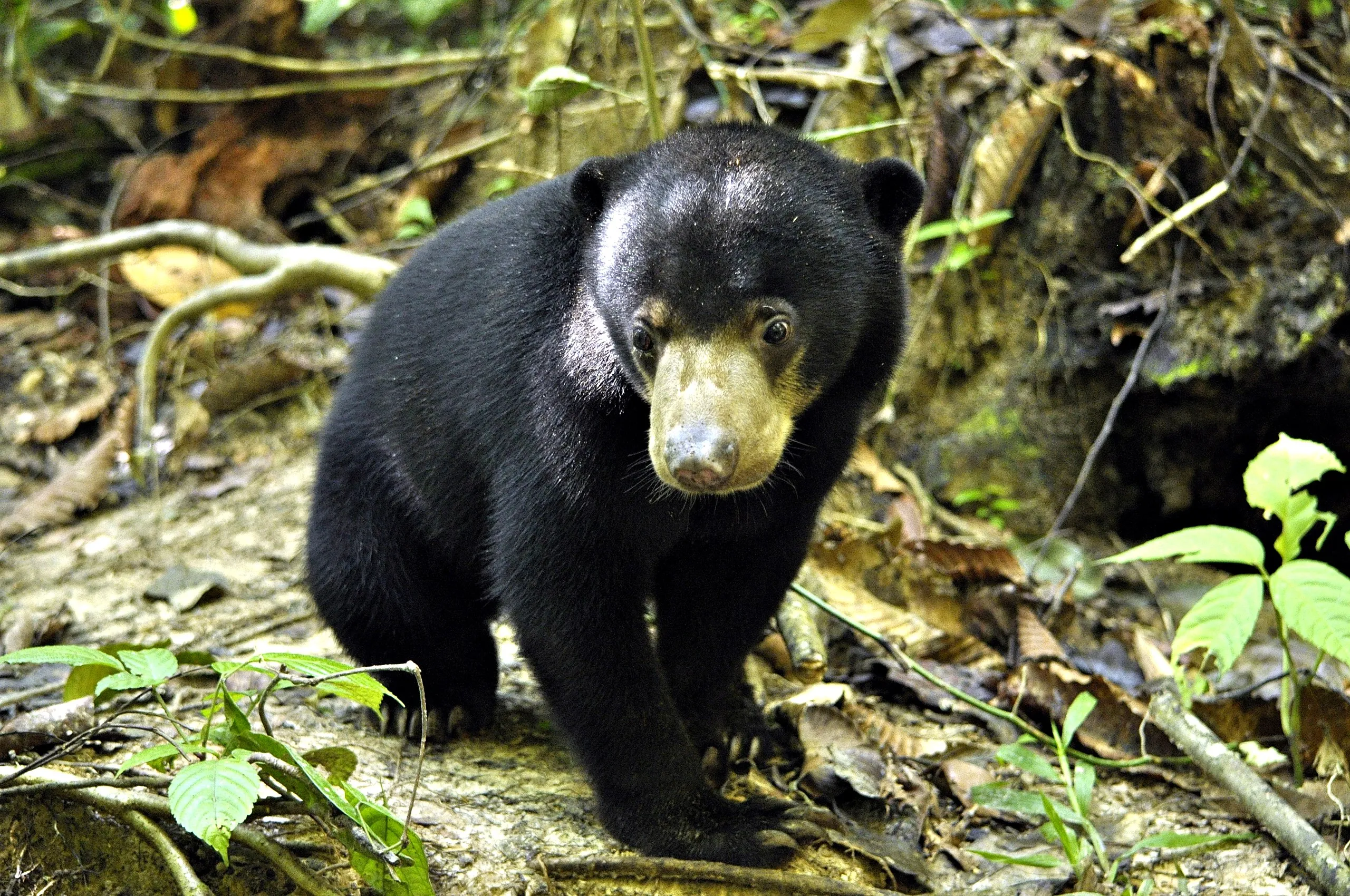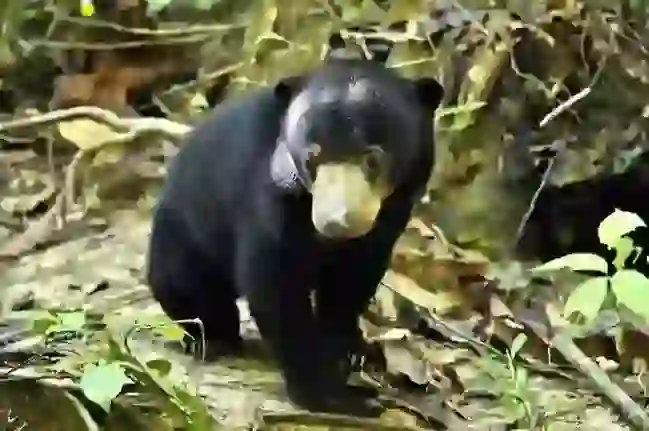
Bornean Sun Bear
Bornean Sun Bear
Bornean Sun Bear
In the rainforests of Borneo, lives the smallest bear in the world, the Bornean sun bear. They have a sun-like marking on their chests, earning them the nickname 'sun bear.' Let's delve into the captivating ecology of the Bornean sun bear and the serious threats they face.
Bornean Sun Bear Basic Infomation

| Property | Value |
|---|---|
| Scientific Name | Helarctos malayanus euryspilus |
| Taxonomic Status | SUBSPECIES |
| Rank | SPECIES |
| Vernacular Names | Bornean sun bear |
| Kingdom | Animalia |
| Phylum | Chordata |
| Class | Mammalia |
| Order | Carnivora |
| Family | Ursidae |
| Genus | Helarctos |
| Habitats | Tropical rainforests of Borneo |
| Conservation Status | Vulnerable (IUCN 2023) |

Size
They measure about 3.9 to 4.9 feet (1.2 to 1.5 meters) in length, and weigh 55 to 143 pounds (27 to 65 kilograms). They are the smallest bear species in the world. Males are larger than females.

Lifespan
They live for about 20 years in the wild and up to 30 years in captivity.

Distribution
They are found in the tropical rainforests of Borneo. They are adapted to hot and humid environments where trees grow densely.
Bornean Sun Bear Q&A

What kind of bear is the Bornean sun bear?
The Bornean sun bear is a subspecies of the sun bear and is known as the smallest bear in the world. They have black fur and a distinctive yellow or orange marking on their chest, which resembles the sun.
This marking is why they are also called 'sun bears'. They are found only on the island of Borneo in Southeast Asia, and their numbers are dwindling year by year. Bornean sun bears are excellent climbers and spend a lot of time in trees. They use their powerful claws and strong jaws to climb tree trunks, break open termite mounds, and gather fruit. They also have long tongues that they use to lick honey.

What do Bornean sun bears eat?
Bornean sun bears are omnivores, eating fruits, insects, honey, and sometimes small mammals and bird eggs.
Their diet varies depending on the season and the climate of the year. When fruits are abundant, they eat a lot of fruit. When fruits are scarce, they eat more insects and honey. They especially love termites and bee larvae. They use their powerful claws to tear open termite mounds and beehives, and their long tongues to lick up the insects and honey inside. They are particularly fond of figs and durian fruits. They sometimes raid plantations to eat coconuts and bananas.

Why are they endangered?
Bornean sun bears are endangered mainly due to human activities.
・Habitat destruction: Their rainforest habitat is being lost due to deforestation, agricultural development, and road construction.
・Poaching: Their gallbladders are highly valued as an ingredient in traditional Asian medicine, making them a target for poachers. Their fur and meat are also illegally traded.
・Human-wildlife conflict: As humans venture into forests for activities like gathering wild vegetables and mushrooms, encounters with bears have increased. This can lead to incidents where bears attack humans, or conversely, humans kill bears.
To protect Bornean sun bears, it is crucial to protect their rainforest habitat, stop poaching, and prevent human-wildlife conflict.

[Quiz!] How are Bornean sun bear cubs raised?
Female Bornean sun bears usually give birth to one to three cubs. The cubs drink their mother's milk for about two years.
Mothers are very protective of their cubs and raise them with care. The cubs learn how to climb trees and find food from their mother. They become independent at around two years of age.

[Quiz!] Do Bornean sun bears hibernate?
Bornean sun bears do not hibernate.
They live in tropical rainforests, where they don't need to hibernate. Tropical rainforests are warm year-round and food is plentiful, so they can be active throughout the year without hibernating.

[Quiz!] What can we do to protect Bornean sun bears?
There are many things we can do to help protect Bornean sun bears.
・Reduce palm oil use: Palm oil is used in a variety of products around us. However, to produce palm oil, rainforests are being cleared, destroying the habitat of Bornean sun bears. By reducing our use of palm oil, we can help protect their habitat.
・Don't participate in the illegal wildlife trade: Bornean sun bear gallbladders, fur, and meat are illegally traded. By refusing to buy these products, we can help reduce poaching.
・Donate to organizations working to protect Bornean sun bears: You can support their conservation efforts by donating to organizations that work to protect Bornean sun bears.
・Learn about Bornean sun bears and spread awareness: By learning about Bornean sun bears and sharing what you've learned with others, you can help raise awareness about their plight and the importance of protecting them.
Even small actions can make a big difference when we all work together. Let's each consider what we can do to help protect the Bornean sun bear, our fellow inhabitants of Earth, and take action!

Would you like to become a part of the 'Animalbook.jp'?
Turn your knowledge into Q&A and share it with the world. ※Publication will be activated after purchase. Let's share information together!
Bornean Sun Bear Type of List

Efforts to Protect Bornean Sun Bears
- Habitat conservation
- Strengthening anti-poaching patrols
- Establishment of protected areas
- Promotion of ecotourism
- Educating local communities
Information
Congratulations! You are the first commenter!

Create Your Favorite List!
Bornean Sun Bear
Save the animals you love! Build your own list to quickly revisit your favorites later.

Would you like to leave a comment?
※Please note: This is for the purchase of rights to post comments within the article.
Find Your Favorites!
Our shop offers a unique and attractive selection of goods themed around various animals.
Bornean Sun Bear References
Bornean Sun Bear Introduction of media used

Siew Te Wong, Thye Lim Tee, and Lin May Chiew, BSBCC, CC BY-SA 3.0 DE, via Wikimedia Commons

Help Enrich Our Animalbook.jp with Your Media!
We are constantly looking to expand and enrich our Animalbook.jp with amazing photos and videos of animals. If you have any media that you'd like to share, please contribute and help us showcase the beauty and diversity of the animal kingdom. Your submissions will be credited and featured in our encyclopedia, reaching a wide audience of animal lovers.


















